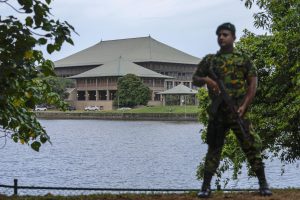On October 21, the Sri Lankan Parliament passed the 22nd Amendment to the constitution, with 179 members of parliament (MPs) voting to curtail the powers of the Sri Lankan presidency. Around 40 MPs, mainly those allied to the Rajapaksa family, abstained from voting.
The passing of the amendment shows that former minister and key strategist of the Rajapaksa clan, Basil Rajapaksa’s influence on Sri Lanka Podujana Party (SLPP) MPs has declined.
While this gives President Ranil Wickremesinghe more operational independence, it also shows that Wickremesinghe can no longer rely on Rajapaksa allies to remain in power. He will need to win the support of other factions in the Sri Lankan parliament.
The 22nd Amendment restores the powers of parliament that were handed to the executive president by former President Gotabaya Rajapaksa through the 20th Amendment of 2020. Gotabaya had reversed the 19th Amendment, which had empowered parliament over the presidency.
While the 22nd Amendment does not curtail the powers of the executive and empower independent institutions as much as civil society activists wanted, there is an almost universal consensus that this was a step in the right direction as it rolls back the worst excesses of the 20th amendment.
One of the main highlights of the 22nd Amendment is the re-establishment of the Constitutional Council, which is entrusted with recommending “fit and proper persons” to be appointed as chairpersons or members of independent commissions, including the Election Commission, the Public Service Commission, the National Police Commission, the Audit Service Commission, the Human Rights Commission of Sri Lanka, Commission to Investigate Allegations of Bribery or Corruption, etc.
With the passing of the 22nd amendment, the president, the cabinet of ministers as well as National Council will be held accountable to parliament. The 15 committees and oversight committees that are operational have been made accountable to parliament. The latest amendment also prohibits those with dual citizenship from contesting in elections. In 2015, Sri Lanka banned those with dual citizenship from holding office, but the 20th amendment repealed the clause, allowing Basil and a few others holding dual citizenship to enter parliament. This change to the constitution had been widely criticized, even by those who had helped pass the 20th Amendment.
However, the president still has the power to dissolve the parliament after two-and-a-half years of its election. They still have the power to influence independent bodies through appointments.
Several civil society groups, including the Centre for Policy Alternatives (CPA) have criticized the bill for not curtailing the powers of the president in a meaningful way. “In the absence of any genuine attempt to address the inherent problems of governance, this attempt at reform will only worsen the existing political and economic crisis and destroy whatever little remaining faith citizens might have in constitutional governance. CPA has carefully considered the contents of the Bill and notes that the Bill does not revert the Constitution to the structure of government that prevailed under the Nineteenth Amendment (2015-19),” the CPA said in a statement.
With the passing of the 22nd Amendment, it has become harder for Basil to use the SLPP to the advantage of the Rajapaksas. Ever since Wickremesinghe was elected president with the support of the SLPP, he has been dependent on the good graces of Basil who has a strong hold on a section of the SLPP.
Even as late as the second week of October, SLPP General Secretary Sagara Kariyawasam insisted that the party did not want to repeal clauses that allow dual citizens from holding office. However, given that only 36 SLPP MPs abstained from voting on Friday, it is reasonable to conclude that Rajapaksa now wields influence over these MPs.
The passing of the amendment might give Wickremesinghe some breathing space from opposition political parties that have been clamoring for a fresh election. While there seems to be some economic stability, albeit temporarily, Sri Lanka has not been able to secure bridging finance from any country, which is vital for Sri Lanka to rebuild the country’s economy. One of the main reasons for this is the perception among the international community, and among Sri Lankans that there is no political stability in the country. Given the increasing economic difficulties due to stagflation, there is no guarantee that another wave of protests would not topple the Wickremesinghe administration.
President Wickremesinghe was elected president with the support of 134 SLPP MPs in late July 2022. It is widely believed that his election was orchestrated by Basil, who then wielded influence over a large number of SLPP MPs. However, as evident in the vote on the 22nd Amendment, Basil’s support in the SLPP has dwindled.
Therefore, the president’s hold on power has become more tenuous as he has to please more political groupings, including the growing ranks of the opposition.
































